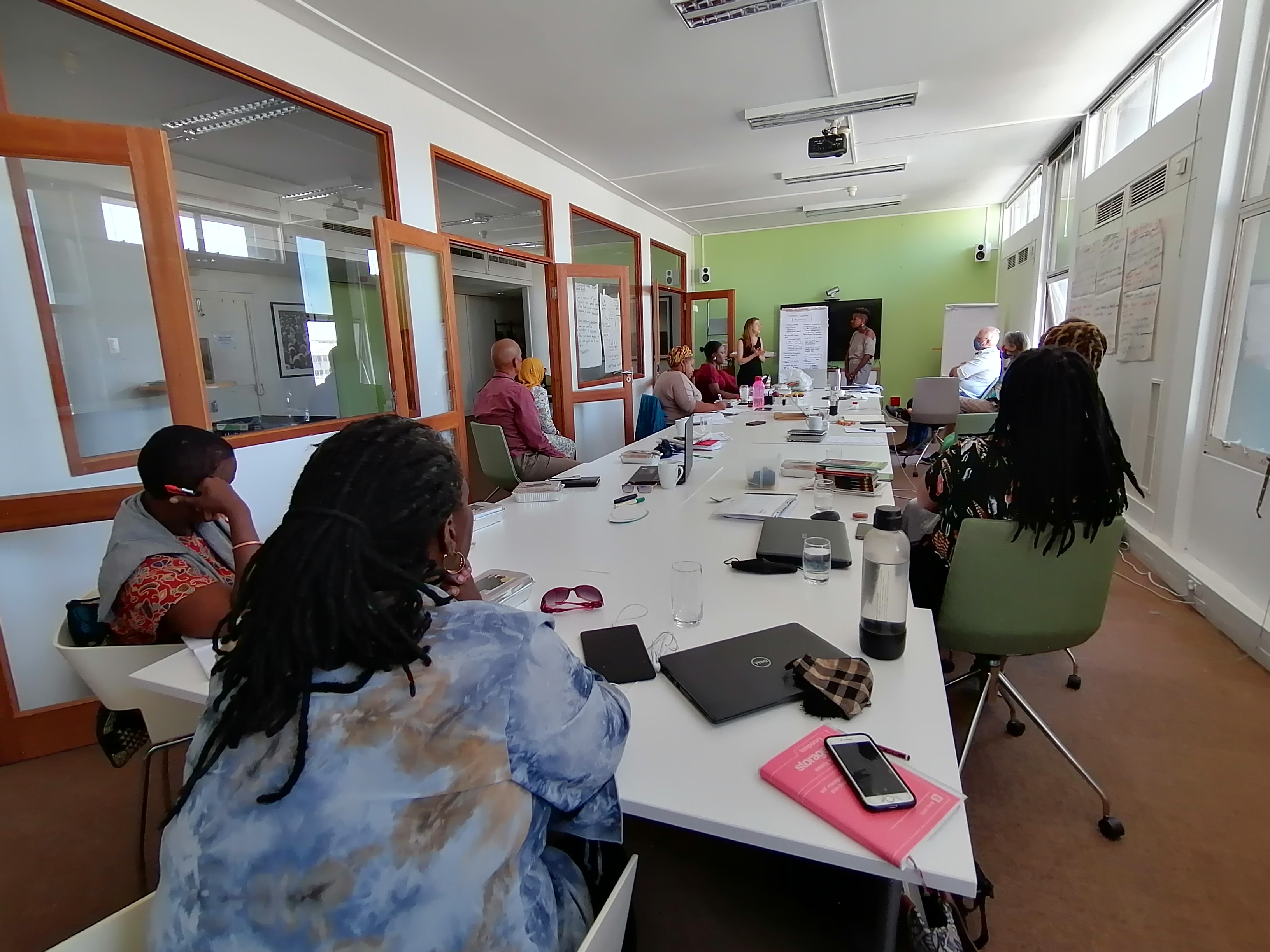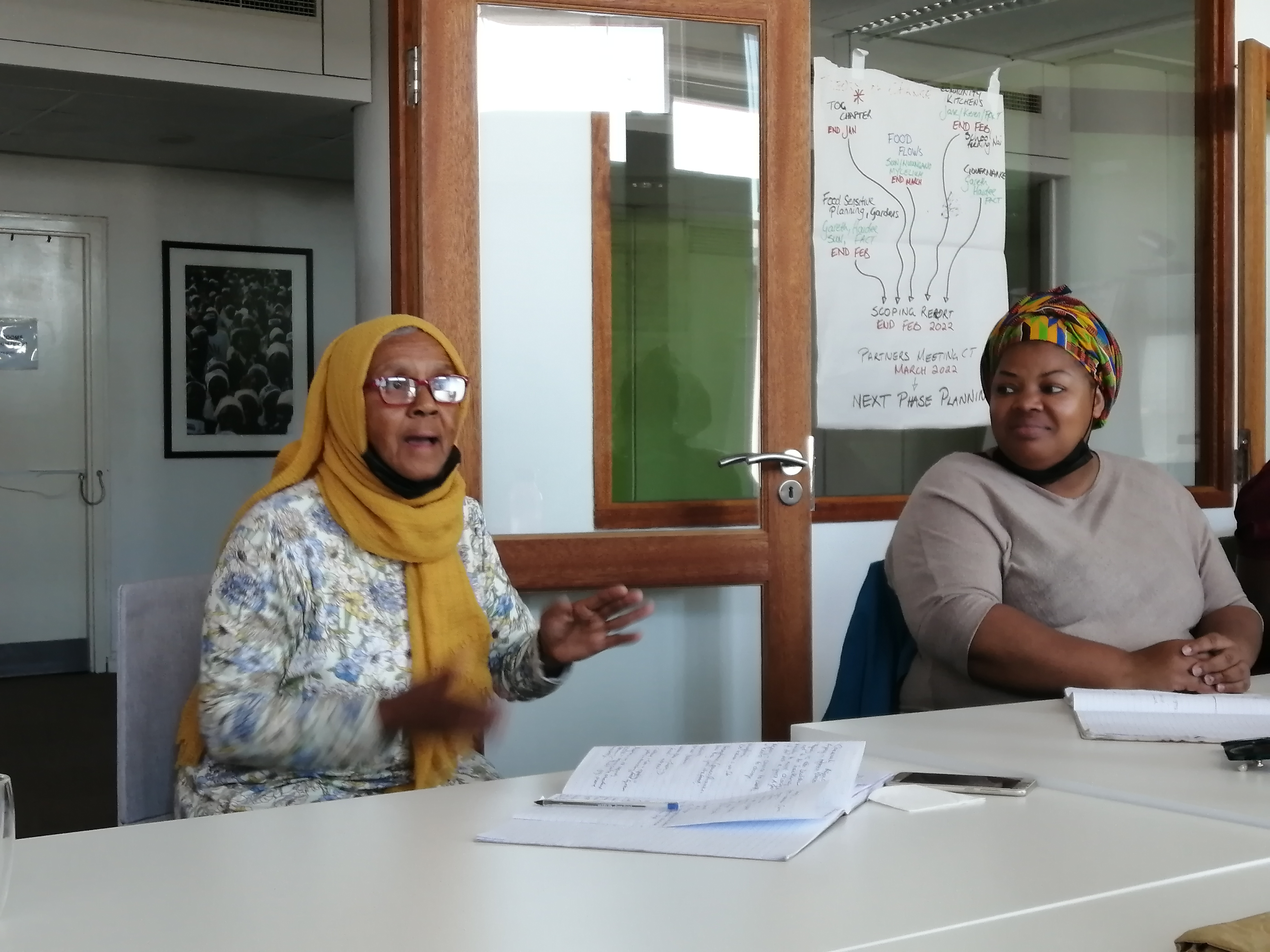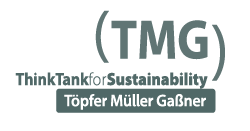Re-Imagining Food In Cities: Working On A Theory Of Change For Urban Food Futures In Cape Town
In January 2022 the Urban Food Futures programme partners in Cape Town met to jointly formulate and discuss the programme's Theory of Change.
by Jemima Spring | 2022-02-09

The start of 2022 sees South Africa emerging from the last wave of Omicron infections, somewhat battered but hopeful that the new year ahead will bring some relief from the challenges of the last couple of years. The Covid-19 pandemic has laid bare society’s cracks and weaknesses and nowhere more so than food security.
Urban Food Futures is a five year transdisciplinary action-research programme working towards more inclusive and resilient urban food systems in three African cities. Currently in its scoping phase in Nairobi, Cape Town, and Ouagadougou, the programme is grounded in place-based action research that recognises the unique context of each research site, and the value of cross-pollinating learnings across sites. Partners from civil society and academia have been collaboratively developing a Theory of Change upon which to build this paradigm shifting work.
Hearing all the voices in the room to create strong foundations
Theory of Change (ToC) is a participatory process in which stakeholders work backwards from the goal(s) they’re hoping to achieve to the specific conditions that would need to be met to get there and identifying “levers of transformation” to develop action plans. The ToC is the foundation or grounding for the whole programme. Thus, it is critical to interrogate it from all angles and perspectives to ensure it informs programme goals across all locations and contexts.
For the Urban Food Futures programme to be truly participatory, every word used in the ToC needs to be defined and fully understood by all partners. This includes using a range of languages and forms of expression. Michael Hauser from the World Agroforestry Centre (ICRAF) co-developed the first draft of the ToC together with the TMG Research team. In November 2021, partners in Nairobi discussed and complemented the proposed ToC. In January 2022, it was the turn of the Cape Town partners.
Community co-researchers and other partners gathered at the offices of Heinrich Boell Foundation in Cape Town, to work through the proposed ToC through the lens of their city. Between them, this group brings a wide range of perspectives, lived experience, academic research and activism to the table.
Food Agency Cape Town (FACT) is an organisation of community researchers who use food as an entry point to explore social justice questions. They have years of experience working with academics and “Mother Theresas” - as Gugulethu farmer Vuyani Qamata describes NGOs - coming into their communities. From this experience stems a strong confidence to ensure their voices are heard. FACT was joined by members of Sustainable Urban Neighbourhoods (SUN), Heinrich Boell Foundation (HBF), African Centre for Cities (ACC), Social Change Assistance Trust (SCAT), and Mycelium Media Colab.
Unpacking complex issues
Lively debates sparked around terminology, such as “community agency,” drawing from the groups’ experiences as urban farmers, community kitchen heads and food activists. No concept was left unexamined, from: “What do we understand by the term agency, or community?”; to “Who is the community and thus who’s agency do we strengthen to create the desired change?”

Partners of the Urban Food Futures programme in Cape Town discussing the Theory of Change ⓒ Jemima Spring
The ToC builds on a number of assumptions, for example that injustices in our food system are systemic, and that there are “lock-ins” in food systems, such as government bureaucracy and corruption. It also highlights windows of opportunity for interventions, for example, exploring the role of nutrition hubs and community kitchens – a key research area for both Cape Town and Nairobi – play as levers for transformation. “But,” asks one partner, “is there an assumption that the mainly women who run them should always be volunteers? Could thinking about this differently strengthen the ToC?”
And the flow of questions continued: Is a “healthier food system” necessarily what people want, or rather a “just food system” in which they have the agency to choose and access healthy food? Should the term “informal settlement” be included in “urban” or does thinking of these settlements as somehow separate from the urban space compound the barriers that already exist? Can “changing the rules of the game” be addressed by “changing the game of the rules”? Can the current “game” accommodate a vision for a just, equitable, nourishing and caring food system?

Washiela Isaacs (FACT) and Nomonde Buthelezi (FACT) ⓒ Jemima Spring
Seeing food as an opportunity, not a problem
The group split in two to explore these issues. One group addressed the ToC through the lense of Food Sensitive Planning (FSP) and the other through Community Kitchens. Each group reflected on the constraints, challenges and opportunities emerging from these perspectives to deliberate how we can make change happen in our food systems?
The Community Kitchens group agreed that change can be initiated for example by capacitating community kitchen heads through peer learning, thereby creating kitchen networks that together can advocate for their needs and visions.
Many members of the FSP group shared stories of frustration when dealing with government programmes and bureaucracy. The system seems “designed to impede and impoverish,” they noted.
After an intensive two days, the participants concluded that a strong ToC needs to include constructive engagement with legislation, policies and gatekeepers. Seeing food as an opportunity not a problem, is the compost from which healthy food cities can grow.
After two years of sitting in virtual meetings, being in a room together does more than the task at hand. Working on a common ToC not only consolidated everyone’s understanding of the proposed programme and how they see themselves within it, but gave partners a chance to connect on other levels, in “real life”, and further create strong foundations to build upon.
 Urban Food FuturesFeb 09, 2026
Urban Food FuturesFeb 09, 2026Pushing the horizon: Urban farming and community-led innovation in Mukuru informal settlement
A small community-run greenhouse in Mukuru is offering insights into how controlled-environment agriculture can strengthen food security in urban environments under increasing pressure—and a look into the future of food systems in informal settlements.
Christian Sonntag, Emmanuel Atamba, Lumi Youm
 Land GovernanceDec 18, 2025
Land GovernanceDec 18, 2025Land tenure, women’s land rights, and resilience: Reflections from CRIC23 toward UNCCD COP17
Our experts discuss what the exchanges at CRIC23 highlighted and revealed about the role of secure and gender-equitable land tenure in the UNCCD's work ahead of the 2026 triple COP year.
Frederike Klümper, Washe Kazungu
 Urban Food FuturesDec 09, 2025
Urban Food FuturesDec 09, 2025The story of Mukuru's Urban Nutrition Hub
In Mukuru informal settlement, a safe haven for women has grown into the Urban Nutrition Hub, a multi-purpose space for nutrition education, training, and community development, demonstrating the potential of grassroots community-owned innovation..
Serah Kiragu-Wissler


